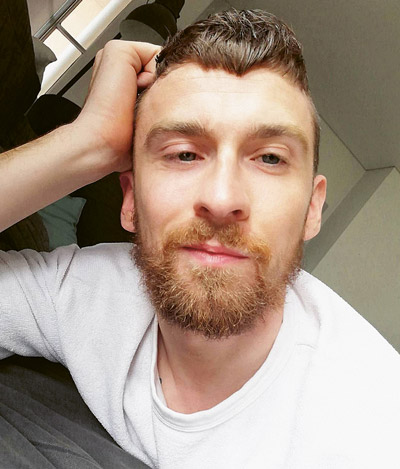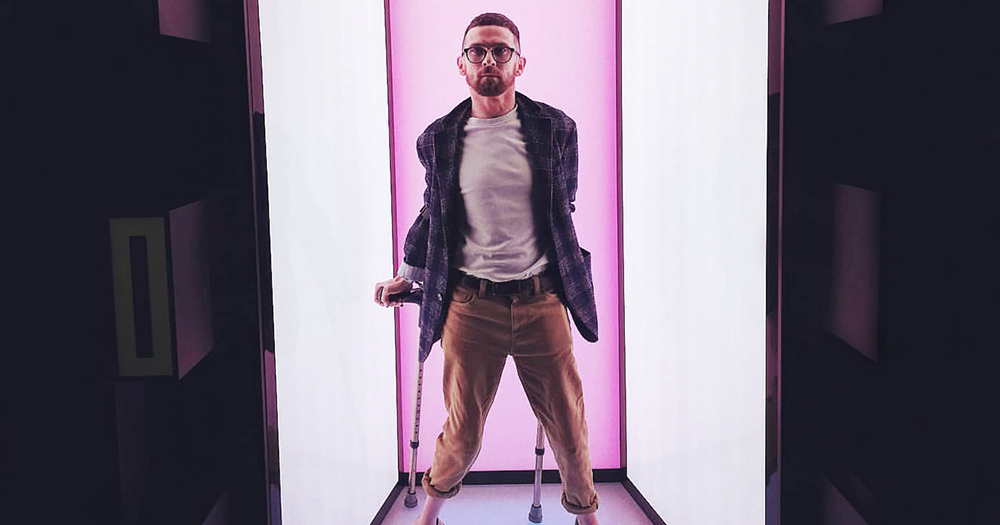I was born with Cerebral Palsy in my legs and walk with crutches. I kind of fell into being an activist but I do it because when I was younger there was no one disabled I could really look up to in the community.
Everyone would put me in a box, feel sorry for me, wonder ‘what are you going to be able to do? You’re not going to be able to have a normal life’. Other disabled activists I saw out there were concerned with politics and changing laws, I just wanted to go out and have fun and have sex, but no one around me could understand that. My insecurities about having a disability included not feeling hot enough, not feeling like I was worth enough, but no one would ever say that – it was always very binary, very black and white problems. I had all this stuff in between.
Starting out dating, I found the gay scene cutthroat. Us gays can be bitches. And I understand that. We’ve gone through so much in our lives with being bullied we have this defence mechanism up all the time where we don’t want to seem weak.
Also, with gay culture it’s all about the physique. Obviously there’s more depth to a gay person than that, but first off it’s all about looks. We live in a society where it’s all about the image you have. And I never fit into that ideal of a gay person.
Guys would be direct – they’d say ‘can you even have sex though, are you able to do it?’ or ‘it must be really difficult for you’. Hearing those things can be very disheartening. Disabled people are treated like babies, like newborns, people are very protective. I think that’s a lot of why they can’t find someone with a disability attractive – because society’s instinct is to protect them and keep them safe, like we’re going to shatter.

With online apps, I suppose there was a part of me that enjoyed that I could hide my disability for a bit. If someone suffered from anxiety or depression for instance, you can hide that, whereas when you first meet me you will know straight away what my vulnerability is.
The apps at first gave me a new lease of confidence, but eventually shot me in the foot, because then I’d have to have that weird conversation – ‘I’m actually disabled’ and then guys would go ‘how disabled?’ and then it would turn into a thing where they would think I’d be worse than I am.
I did an experiment with Tinder about a year ago where I chatted to five lads over the course of time and it all got to the point where the next step was you would ask for the date. So I told four of them I was disabled, one I didn’t. The four that I told I was disabled all came straight back with excuses why they didn’t want to meet me. And then the one I didn’t say it to met me and was obviously shocked at the beginning, but we had great fun.
It made me feel upset they wouldn’t meet up with me. Why did I waste time with them? I understood why I did it, but all you actually do is prolong the inevitable, because those type of people are not going to meet me regardless, they are not going to give me a chance. From then on I was upfront, I put up disabled pictures.
I have a partner now who liked me for me, the disability didn’t come first.
Sometimes for guys, I would have been a fantasy. They would be like – ‘oh my god, you’re disabled’, so I could be a notch on the bedpost. They could fantasize about it – overpower me almost.
Sometimes I wonder if it would have been a different experience if I was straight. Women seem to have more emotional intelligence on issues like this. Don’t get me wrong, if I wasn’t disabled I would probably be like any other gay man, because within gay culture we have tougher exteriors, find it difficult to let ourselves get emotionally involved as we feel exposed.
I’m speaking at an event for younger people with the theme ‘What advice would you give to your younger self?’. The advice I would give to my younger self would be to believe in myself more. And to not try so hard to fit in- to accept my own flag and fly it. And don’t be afraid not to be liked! Have the confidence in yourself to be okay with people not liking you.
This article was originally published in GCN Issue 348. Click here to read it now.
© 2018 GCN (Gay Community News). All rights reserved.
Support GCN
GCN is a free, vital resource for Ireland’s LGBTQ+ community since 1988.
GCN is a trading name of National LGBT Federation CLG, a registered charity - Charity Number: 20034580.
GCN relies on the generous support of the community and allies to sustain the crucial work that we do. Producing GCN is costly, and, in an industry which has been hugely impacted by rising costs, we need your support to help sustain and grow this vital resource.
Supporting GCN for as little as €1.99 per month will help us continue our work as Ireland’s free, independent LGBTQ+ media.
